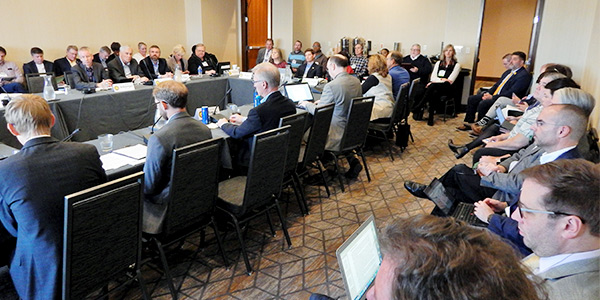By Tom Kleckner
SAN ANTONIO — State regulators working to improve MISO–SPP interregional planning processes and seams issues drew more than three dozen interested onlookers to their latest committee meeting on Sunday.
Continuing a trend for much of the last year, the SPP RSC/Organization of MISO States Liaison Committee held its meeting in conjunction with a conference of the National Association of Regulatory Utility Commissioners (NARUC). But that may soon be changing.
During a discussion on timelines, North Dakota Commissioner Julie Fedorchak echoed the frustration of several members when she said, “We don’t move quickly enough.”
Kansas Corporation Commissioner Shari Feist Albrecht, who leads the SPP side of the committee, agreed the group’s progress is slow, hampered in part by insufficient face-to-face time between the RSC and OMS members.
“It’s moving too slow,” she said. “I’m hoping we can develop a regular schedule of meetings going forward.”
The committee intends to rectify that situation by scheduling at least one meeting in early 2020, albeit possibly through the web, for an education session on SPP’s and MISO’s planning processes before NARUC’s next meeting.
FERC Commissioner Richard Glick was among those who sat in on the Nov. 17 meeting, being granted a seat at the table while others lined the walls. He declined to offer comments during the discussion but did address the session two days later during NARUC’s annual meeting.
“I appreciated being invited. It was a very interesting discussion,” Glick said during a Q&A session with outgoing NARUC President Nick Wagner. “It’s pretty apparent that we’re not necessarily building the transmission system that might be needed for the grid of the future. We’re not going to resolve those issues today. If we can do a better job of planning between regions, that would really be helpful.”
Three separate coordinated studies between the ISOs have failed to yield a joint project. Stakeholders have laid much of the blame on differences in modeling and criteria between the grid operators, which has led to market inefficiencies. (See MISO, SPP to Ease Interregional Project Criteria.)
While meeting irregularly since last year’s creation, the liaison committee has gathered stakeholder feedback and commissioned the RTOs’ market monitors to analyze the seams issues. (See RSC, OMS Approve Monitors’ Seams Study.)
SPP’s Market Monitoring Unit finished a draft report on rate pancaking and unreserved transmission use in time for the meeting.
MISO’s Independent Market Monitor is scheduled to wrap a study on joint dispatch before year’s end. The IMM is also working on suggested changes to the market-to-market framework with the SPP-MISO joint operating agreement. The latter report may not be finalized until spring 2020.
The MMU’s analysis indicated removing duplicate transmission charges (rate pancaking) has a very limited effect on import and export volumes. The SPP Monitor said most transactions are “inelastic” to the market-clearing price and the majority of these transactions are already taking advantage of market import service in the SPP footprint and a comparable service in MISO.
Its study of SPP unreserved use charges since 2016 revealed they are unaffected by the SPP-MISO seam. The MMU said it could not quantify an impact of these charges on interchange volumes and “abstained” from providing an opinion on the current processes.
The work that lies ahead prompted Dana Murphy, chair of the Oklahoma Corporation Commission, to ask for clarification on just who various studies’ stakeholders are?
“My concern in general is who is asking the RTOs to do this background work?” Murphy said. “We have to be thoughtful in our communicating and what we are communicating.”







